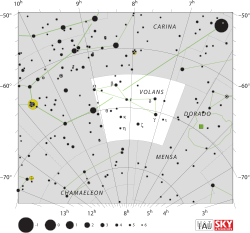Eta Volantis
Eta Volantis, Latinized from η Volantis, is a single star[9] in the southern constellation of Volans. It has an apparent visual magnitude of 5.28,[2] which is bright enough to be seen with the naked eye as a dim, white-hued star. Based upon parallax measurements, it is approximately 375 light years from the Sun. The star is moving further away from the Sun with a radial velocity of 20 km/s.
 | |
| Observation data Epoch J2000.0 Equinox J2000.0 | |
|---|---|
| Constellation | Volans |
| Right ascension | 08h 22m 04.45154s[1] |
| Declination | −73° 23′ 59.9273″[1] |
| Apparent magnitude (V) | 5.28[2] |
| Characteristics | |
| Spectral type | A0/1 IV/V[3] |
| B−V color index | +0.01[2] |
| Astrometry | |
| Radial velocity (Rv) | +20.0±3.7[4] km/s |
| Proper motion (μ) | RA: −29.412[1] mas/yr Dec.: +30.007[1] mas/yr |
| Parallax (π) | 8.7036 ± 0.1313[1] mas |
| Distance | 375 ± 6 ly (115 ± 2 pc) |
| Absolute magnitude (MV) | 0.05[5] |
| Details | |
| Mass | 2.73±0.08[5] M☉ |
| Radius | 3.43[5] R☉ |
| Luminosity | 84[6] L☉ |
| Surface gravity (log g) | 3.81±0.04[5] cgs |
| Temperature | 8,663[6] K |
| Rotational velocity (v sin i) | 214[7] km/s |
| Age | 347[5] Myr |
| Other designations | |
| Database references | |
| SIMBAD | data |
This is an A-type star with a stellar classification of A0/1 IV/V,[3] displaying blended spectrum that shows aspects of a main sequence star and a subgiant. The star is an estimated 347[5] and is spinning rapidly with a projected rotational velocity of 214 km/s.[7] It has 2.73 times the mass of the Sun and 3.43 times the Sun's radius.[5] Eta Volantis is radiating 84[6] times the luminosity of the Sun from its photosphere at an effective temperature of 8,663 K.[6]
Eta Volantis has two 12th magnitude optical companions at angular separations of 26.8 and 48.1 arcseconds.[10]
References
- Brown, A. G. A.; et al. (Gaia collaboration) (August 2018). "Gaia Data Release 2: Summary of the contents and survey properties". Astronomy & Astrophysics. 616. A1. arXiv:1804.09365. Bibcode:2018A&A...616A...1G. doi:10.1051/0004-6361/201833051. Gaia DR2 record for this source at VizieR.
- Mermilliod, J.-C. (1986), "Compilation of Eggen's UBV data, transformed to UBV (unpublished)", Catalogue of Eggen's UBV Data. SIMBAD, Bibcode:1986EgUBV........0M.
- Houk, Nancy (1978), Michigan catalogue of two-dimensional spectral types for the HD stars, 1, Ann Arbor: Dept. of Astronomy, University of Michigan, Bibcode:1975mcts.book.....H.
- Kharchenko, N. V.; et al. (2007), "Astrophysical supplements to the ASCC-2.5: Ia. Radial velocities of ˜55000 stars and mean radial velocities of 516 Galactic open clusters and associations", Astronomische Nachrichten, 328 (9): 889, arXiv:0705.0878, Bibcode:2007AN....328..889K, doi:10.1002/asna.200710776.
- Gerbaldi, M.; et al. (June 1999), "Search for reference A0 dwarf stars: Masses and luminosities revisited with HIPPARCOS parallaxes", Astronomy and Astrophysics Supplement, 137 (2): 273–292, Bibcode:1999A&AS..137..273G, doi:10.1051/aas:1999248.
- McDonald, I.; Zijlstra, A. A.; Boyer, M. L. (2012). "Fundamental Parameters and Infrared Excesses of Hipparcos Stars". Monthly Notices of the Royal Astronomical Society. 427 (1): 343–57. arXiv:1208.2037. Bibcode:2012MNRAS.427..343M. doi:10.1111/j.1365-2966.2012.21873.x.
- Royer, F.; et al. (February 2007), "Rotational velocities of A-type stars. III. Velocity distributions", Astronomy and Astrophysics, 463 (2): 671–682, arXiv:astro-ph/0610785, Bibcode:2007A&A...463..671R, doi:10.1051/0004-6361:20065224.
- "* eps Vol". SIMBAD. Centre de données astronomiques de Strasbourg. Retrieved 2016-09-02.
- Eggleton, P. P.; Tokovinin, A. A. (September 2008), "A catalogue of multiplicity among bright stellar systems", Monthly Notices of the Royal Astronomical Society, 389 (2): 869–879, arXiv:0806.2878, Bibcode:2008MNRAS.389..869E, doi:10.1111/j.1365-2966.2008.13596.x.
- Mason, B. D.; et al. (2014), The Washington Visual Double Star Catalog, Bibcode:2001AJ....122.3466M, doi:10.1086/323920